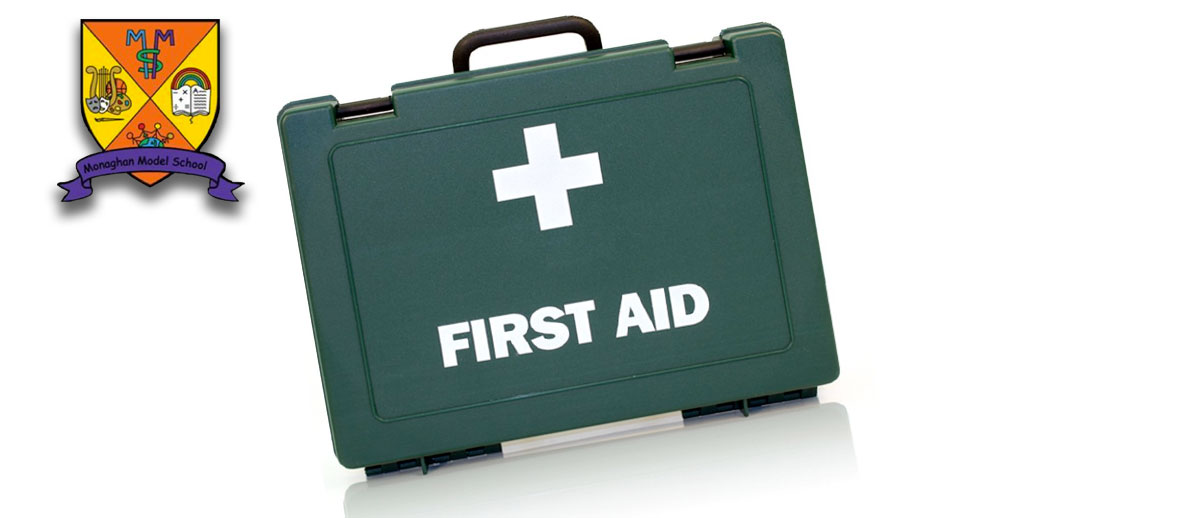A sick child should not be at school, but if a child becomes ill or informs an adult that s/he is feeling unwell, then one of our staff members will contact a parent.
Download this Complete Document for Signature options. Some browsers open the PDF in a new window, in this case you will be required to "Save" the pdf.
MONAGHAN MODEL SCHOOL POLICY ON ADMINISTRATION OF MEDICINES
General Principles
While the Board of Management has a duty to safeguard the health and safety of pupils when they are engaged in authorised school activities, this does not imply a duty upon teachers to personally undertake the administration of medicines. A teacher has no contractual duty to administer medication and cannot be required to do so. Administration of medication is a voluntary act by teachers.
A pupil who is sick and clearly unwell should not be in school. In such circumstances the Principal is within his/her rights to ask the parent to keep the pupil at home.
Non-prescribed medicines will neither be stored nor administered to pupils in school.
The Board of Management requests parents to ensure that the principal and class teacher be made aware in writing of any medical condition suffered by their child/children.
Prescribed medicines will not be administered in school without a written request and the consent of a parent or guardian.
If pupil is self-administering any medication a note should be sent to the class teacher informing her of parental consent for this.
Where possible the family doctor should arrange for the administration of prescribed medicines outside of school hours.
Medication During School Hours
Occasionally a parent may request that prescribed medication be administered to a pupil during the school day. This must be accompanied by a note stating the dosage, time of administration and be signed by a parent.
In the case of medicines prescribed for long-term conditions, e.g. diabetes, allergic reactions, epilepsy etc a consenting teacher will administer medication with the consent of the Board of Management.
Parents of a pupil requiring regular medication during school hours should write to the Board of Management to authorise consenting staff to administer the medication in school.
The written request should give all or some of the following information as appropriate:
- The name of the child;
- The nature of the pupil’s condition;
- The symptoms;
- What medication is required, the prescribed dosage, at what times or under what circumstances;
- Whether the medication is self administered or has to be administered;
- Consent for the medication to be given;
- What action, if any, apart from administering medication, may be needed, and if so, what time or in what circumstances;
- An outline of the circumstances in which the parent should be notified giving contact telephone numbers
- An outline of the circumstances, which would necessitate the pupil receiving emergency medical care from a doctor or admission to an A&E Hospital Department.
Where permission has been given by the Board of Management for the administration of medicine the smallest possible dose should be brought to school, preferably by the parent, with all necessary information and instruction regarding administration attached.
The medicine should be clearly labelled with:
- The child’s name
- Date
- Contents (the original container supplied by the pharmacist or GP should be delivered to the school)
- Dosage
- Instructions regarding storage
When a member of staff is administering emergency medication there should be TWO adults present.
A written record of the date and time of administration must be kept and a note of any side effects.
Changes in prescribed medication or dosage should be notified immediately to the school with clear instructions of the procedure to be followed in storing and administering the new medication.
Where a child is suffering from a life-threatening condition, parents should outline clearly in writing what can be done in an emergency situation, with particular reference to what may be a risk to the child.
Storage of medication
Medication, held by the school to respond to emergency situation, is kept in the Principal’s Office with the written instructions as given by the parent/guardian attached. Parents/guardians are responsible for replacing medication held in storage for emergency situations when it has reached its expiry date.
Security and accessibility are equally important.
Certain medicines, such as inhalers used by asthmatic children, must be readily accessible at all times of the day. Diabetic students take responsibility for administering their own regular medication at the earliest possible age and are responsible for the safe carrying of their testing kit and insulin injection. The medicine should be self-administered if possible.
Medication on School Trips
Again security and accessibility of the medication are equally important. Parents have the responsibility of ensuring that pupils have the necessary medication when going on school trips and should liase with the teachers on the trip regarding the needs of the pupil to ensure his/her safety and welfare.
Parents are further required to indemnify the Board of Management and authorised members of staff in respect of any liability that may arise regarding the administration of prescribed medicines in school. Reviewed & Revised in May 2016 Ratified by Board of management on 16th June 2016


